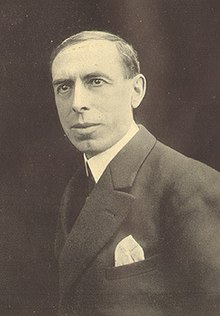Luigi Maggi: Difference between revisions
Content deleted Content added
No edit summary |
m Bot: link syntax |
||
| (26 intermediate revisions by 22 users not shown) | |||
| Line 1: | Line 1: | ||
{{Short description|Italian actor and film director}} |
|||
{{Use dmy dates|date=May 2016}} |
|||
{{Infobox person |
{{Infobox person |
||
| ⚫ | |||
|image = |
|||
| image = Luigi Maggi.jpg |
|||
|imagesize = |
|||
| |
| imagesize = |
||
| |
| caption = |
||
| birth_date = {{Birth date|df=yes|1867|12|21}} |
|||
| ⚫ | |||
| ⚫ | |||
| imagesize = |
|||
| death_date = {{death date and age|df=yes|1946|08|22|1867|12|21}} |
|||
| caption = |
|||
| ⚫ | |||
| birth_date = 21 December 1867 |
|||
| ⚫ | |||
| death_date = 22 August 1946 |
|||
| ⚫ | |||
| othername = |
| othername = |
||
| occupation = Actor |
| occupation = Actor, director |
||
| yearsactive = |
| yearsactive = 1906–1928 |
||
| imdb_id = 0535957 |
|||
}} |
}} |
||
'''Luigi Maggi''' ( |
'''Luigi Maggi''' (21 December 1867 – 22 August 1946) was an Italian actor and film director who worked prolifically during the [[Silent film|silent era]]. Working for [[Ambrosio Film]] he co-directed the 1908 hit film ''[[The Last Days of Pompeii (1908 film)|The Last Days of Pompeii]]'', which launched the [[historical epic]] as a popular Italian genre.<ref>Moliterno p.6</ref> |
||
==Selected filmography== |
==Selected filmography== |
||
===Director=== |
===Director=== |
||
* |
*''[[The Last Days of Pompeii (1908 film)|Gli ultimi giorni di Pompei]]'' (''The Last Days of Pompeii'') (1908) |
||
* |
*''[[Nero (1909 film)|Nerone]]'' (''Nero'') (1909) |
||
* |
*''{{ill|Galileo Galilei (1909 film)|lt=Galileo Galilei|it|Galileo Galilei (film)}}'' (1909) |
||
*''[[Il guanto]]'' (''The Glove'') (1910), a [[List of rediscovered films|rediscovered lost film]] |
|||
*''{{ill|Nozze d'oro|it}}'' (''After Fifty Years'', ''The Golden Wedding'') (1911) |
|||
* ''The Queen of Nineveh'' (1911) |
|||
*''{{ill|Il fornaretto di Venezia (1914 film)|lt=Il fornaretto di Venezia|it|Il fornaretto di Venezia (film 1914)}}'' (1914), with [[Paola Pezzaglia]] |
|||
*''{{ill|La bambola vivente|it}}'' (1924) |
|||
== References == |
== References == |
||
{{Reflist}} |
{{Reflist}} |
||
== |
== Sources == |
||
* |
*Moliterno, Gino. ''Historical Dictionary of Italian Cinema''. Scarecrow Press, 2008. |
||
* |
*Winkler, Martin M. ''Troy: From Homer's Iliad to Hollywood Epic''. John Wiley & Sons, 2009. |
||
== External links == |
== External links == |
||
* |
*{{IMDb name|0535957}} |
||
{{Authority control}} |
|||
| ⚫ | |||
{{DEFAULTSORT:Maggi, Luigi}} |
|||
[[Category:1867 births]] |
[[Category:1867 births]] |
||
[[Category:1946 deaths]] |
[[Category:1946 deaths]] |
||
[[Category:Italian film actors]] |
[[Category:Italian male film actors]] |
||
[[Category:Italian film directors]] |
[[Category:Italian film directors]] |
||
[[Category: |
[[Category:Male actors from Turin]] |
||
[[Category:20th-century Italian male actors]] |
|||
[[Category:Film people from Turin]] |
|||
{{Italy-actor-stub}} |
|||
[[it:Luigi Maggi]] |
|||
| ⚫ | |||
Latest revision as of 05:19, 8 September 2023
Luigi Maggi | |
|---|---|
 | |
| Born | 21 December 1867 |
| Died | 22 August 1946 (aged 78) Turin, Piedmont, Italy |
| Occupation(s) | Actor, director |
| Years active | 1906–1928 |
Luigi Maggi (21 December 1867 – 22 August 1946) was an Italian actor and film director who worked prolifically during the silent era. Working for Ambrosio Film he co-directed the 1908 hit film The Last Days of Pompeii, which launched the historical epic as a popular Italian genre.[1]
Selected filmography[edit]
Director[edit]
- Gli ultimi giorni di Pompei (The Last Days of Pompeii) (1908)
- Nerone (Nero) (1909)
- Galileo Galilei (1909)
- Il guanto (The Glove) (1910), a rediscovered lost film
- Nozze d'oro (After Fifty Years, The Golden Wedding) (1911)
- The Queen of Nineveh (1911)
- Il fornaretto di Venezia (1914), with Paola Pezzaglia
- La bambola vivente (1924)
References[edit]
- ^ Moliterno p.6
Sources[edit]
- Moliterno, Gino. Historical Dictionary of Italian Cinema. Scarecrow Press, 2008.
- Winkler, Martin M. Troy: From Homer's Iliad to Hollywood Epic. John Wiley & Sons, 2009.
External links[edit]
- Luigi Maggi at IMDb
